#révolution french
Explore tagged Tumblr posts
Text
Ce qui se passe en France, c'est ce qui se passe presque partout sur le Globe. Notre société ce casse la gueule, faute à notre système créé pour les riches est sa bourgeoisie. Et oui, cela ne date pas d'aujourd'hui, tu as de l'argent, tu as un toit, tu as à manger, des habits, est des nombreux biens matériels. Tu as n'a pas, le système tente tout pour te prendre ce que tu possèdes, alors tu tombes en mode survie, tu finis ou a la rue, ou dans la criminalité. Peu importe ton âge ton passé, ton origine ou même ton état de santé. Si le système, a pu se survivre ainsi durant des siècles, c'était avant le dérèglement climatique. La dévitalisation du monde, faute à la pollution, a la tuerie animal de masse, comme d'insecte est végétal, est à la surpopulation humaine. Le système est ses sergents qui n'acceptent que l'argent propre, car là et leurs intérêts vous diront aller travailler produisez de la monnaie est réinjecté là. Sauf que les conditions actuelles du monde, ne permettent pas l'emploi de masse, alors il faut des sacrifices comme des sacrifiés. Et devinez pour l'intérêt de qui ? Ainsi eux veulent survivre, et maintenir leur système chéri en place coute que coutent, quels que soient les sacrifices comme les sacrifiés. Miame, la monnaie, c'est trop bon… Au pire ils ont un joker, les armes, les prisons, les maladies et les guerres. Ainsi va leur beau monde.
#france#gilet jaune#gillets jaunes#révolution french#résistance#anonynous#révolution#resistance#french#gilets jaune
2 notes
·
View notes
Text

Marie Antoinette being taken to her Execution, 16 October, 1793 by William Hamilton
#william hamilton#art#marie antoinette#execution#french#france#ancien régime#french revolution#history#europe#european#nobility#royalty#guillotine#place de la révolution#place de louis xv#soldiers#troops#revolutionary france
135 notes
·
View notes
Text
Hi Frevblr. I've bought this gem full of original 1833's engravings about many frev themed events, by Frilley, Fontaine, Dutillois (and others not mentioned) .
I've tried to fix the resolution as best as I could. Enjoy ;3



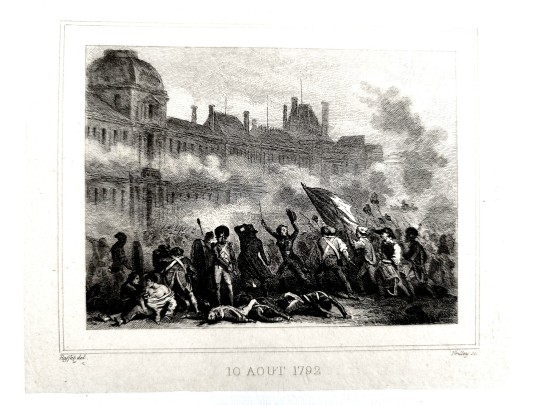






#frev#frevblr#engraving#french revolution#robespierre#danton#camille desmoulins#marat#la révolution française#history
79 notes
·
View notes
Text


la vertu sans laquelle la terreur est funeste;
an old sketch i decided to post because apparently people here want to look at robespierre
69 notes
·
View notes
Text
Camille Desmoulins and Maximilien Robespierre – doomed by the Revolution?
a second part of the answer to the ask kindly sent by @iron--and--blood - first part can be found here
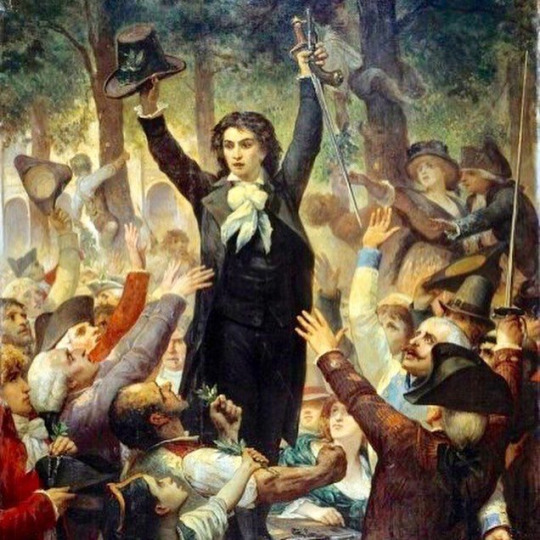
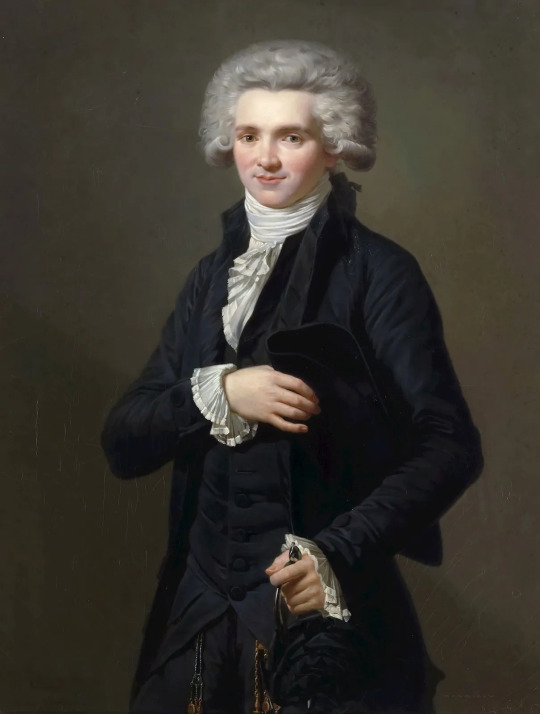
Okay, so I tried to follow the sources and I ended up missing what is arguably the key question. I think that there is enough evidence that warrants seeing Camille and Maximilien’s relationship as a ‘friendship torn apart but the revolution’, but could it in fact be something more that the chain of events of the mid-1790s ended up destroying?
(aka the good old “were they gay?” question)
It’s probably not surprising to anyone that there is no conclusive evidence that would suggest that either of them was definitely queer or that they were involved in some kind of a relationship. For context, the French Constitutional Assembly did decriminalise homosexuality, since there was simply no mention of private same-sex relationships it in the penal code of 1791.
Of course, there would still be a stigma surrounding queerness, seeing how France was a Catholic country – well, up to that point. On the other hand, it is also important to remember that anyone who received a higher education at that time would be well versed in classical authors (Greek and Roman that is), so they would have a framework for a positively viewed queer attraction/relationship (I'm mostly thinking of a kind of Alcibiades/Socrates vibes here. I think it sort of fits? Well it does in my headcanon anyway...). Camille especially seemed to be really into classics, making references to classical authors, history or mythology in approximately every other sentence.
CAMILLE – VICES HONTEUX AND A POSSIBILE BICON
If we consider Camille, I think it is clear that he was attracted to women. I think that the historical sources show that he genuinely did love his wife - Lucile - although it may also be true he was bit of a cad. There is a whole deal with him and Lucile’s mother with whom he apparently exchanged some flirty letters? I honestly need to look into it more at some point.
That said, attraction to women of course doesn’t exclude attraction to men. The one thing that would suggest Camille might have pursued a same-sex relationships is the reference to “vices honteux“ (shameful vices), which Saint-Just claims were attributed to Camille by Danton. We also learn from Robespierre’s note that this refered to something that was ‘totally unrelated to the revolution’.
So we know it’s something that would be seen as ‘shameful’ behaviour, but nonetheless a private matter. Could it be interest in same-sex relationships? It’s of course hard to say, but the theory is not completely implausible. For a discussion about this, I recommend this article.
MAXIMILIEN – A CONFIRMED BACHELOR?
With Maximilien Robespierre, it gets a little more complicated. He was essentially a confirmed bachelor, living with a family that adored him but that was not his own (and also a dog. He had a dog.) Talk about a found family trope!
Some sources claim that he was engaged to Éléonore Duplay, but Robespierre’s sister for one vehemently denies this. It’s true that he could probably easily have married her – I can’t imagine her family being opposed to it, far from it probably – but the fact is that for one reason or another, he did not.
He also didn’t really seem to capitalise on his massive popularity among the Parisian women. (Though, to be fair, neither did Rousseau and he was… well I guess he was his own version of heterosexual.)
Sure, one can interpret that as Robespierre being a workaholic or putting the revolution above everything else, but I personally think it is very possible that he would be considered to be on the asexual spectrum by today’s standards.
That said, although France was moving away from institutionalised religion at that point, Catholic guilt could certainly play a role, especially in someone who prided himself in his moral conduct and was told to be rigid about the rules. So the possibility of him being closeted as an explanation for his lack of interest in women would also not be completely off the table.
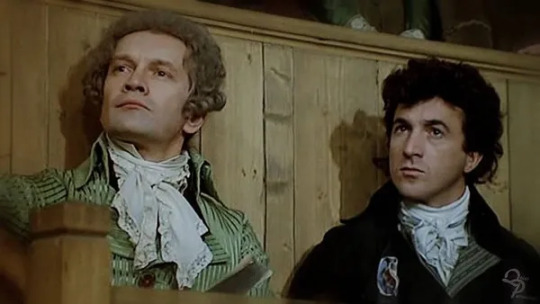
As to Camille and Maximilien being together in some way? I think there is certainly a precedence for this type of relationship in adolescence. Seeing that they have studied together (and shared enthusiasm for classics probably), it is not impossible, though of course, it is highly speculative.
I think it is also fair to say that Robespierre went above and beyond for Camille until the last few months. That is something he probably would have not done for many other people. He actually said as much himself:
“Learn, Camille, that if you were not Camille, one could not have so much indulgence for you.“
Was it because Camille was universally liked by the revolutionaries for all the good he has done? Possibly, but I think one can also read more into it. It certainly suggests that Camille was special in some way, and the fact that Robespierre uses ‚one‘ instead of ‚I‘ does not necessarily mean he is not speaking about himself here.
CAMILLE AND MAXIMILIEN IN THE MEDIA
When it comes to media portrayal, the relationship often comes across as queer-coded - to an extent.
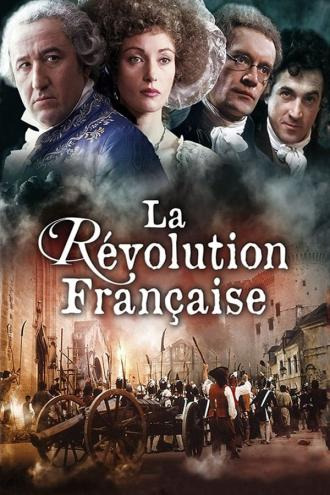
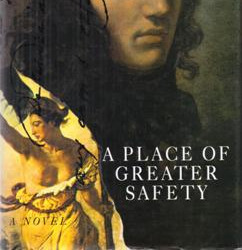
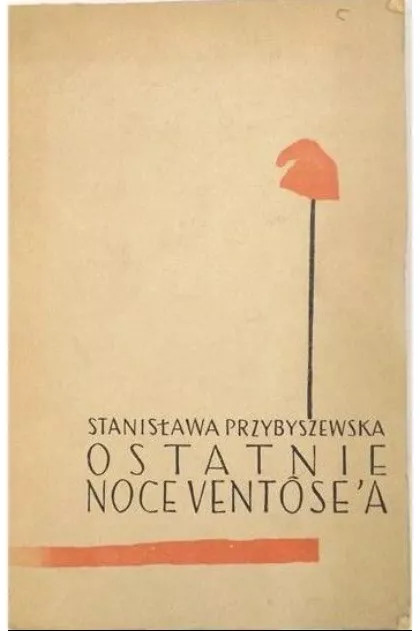
In La Révolution française, this aspect is more prominent between Robespierre and Saint-Just, but with some well-timed smiles and glances, it almost reads as a tragic love triangle between the three. There are some unfortunate implications however, mainly that the hints of Robespierre's queerness in the movie are implicitly associated with his descent to tyrany. Ugh. (And let's face it, a kind of effeminacy linked to villainy as well. Honestly, who thought that kind of portrayal would be a good idea? Kudos for making a historical movie about the French Revolution come across as homophobic I guess.)
Hilary Mantel straight-up makes Camille Desmoulins bisexual (ish?) in A Place of Greater Safety, though there are <a lot of> issues with that portrayal, as discussed here (watch me linking another mutual's great post! Frevblr is truly the best). Not sure how the relationship with Robespierre is presented here since it’s one of the books I’ve been in the middle of for months.
And then there’s Stanisława Przybyszewska of course. She would honestly warrant a separate post, but long story short: in her works, there is no doubt about the fact that she portrays the relationship between them as queer. She invokes the Erastes/eromenos dynamic between them (quite explicitly, referring to Camille as an ephebe at one point) and makes the attraction between the two seem palpable. There is plenty of queer (under)tones to be found in The Danton Case, but in Last Nights of Ventôse , she straight up interprets the fall of the Dantonists as Camille running into Danton’s arms to spite Robespierre for snubbing him and rejecting his devotion (romantic advances?). And it gets quite physical – not in a way that would warrant an E rating, but it would certainly deserve one for the sheer emotional intensity.
#there is a great fic that explores the idea of Robespierre being ace btw. Features some A+ philosophical discussions as well#the only issue is the fact that the other person in the pairing is --#no - shan't say!#frev#french revolution#asks#camille desmoulins#maximilien robespierre#queer history#frevblr#frev community#robesmoulins#1700s#history#stanisława przybyszewska#hilary mantel#a place of greater safety#the danton case#la révolution française#la revolution francaise#bisexuality#asexuality#Éléonore Duplay#robespierre#desmoulins#queer analysis#saint-just#louis antoine de saint just#lucile desmoulins#georges danton
95 notes
·
View notes
Text
I cannot believe I sit through hours of lecture on the French Revolution of 1789, hours of lecture on French history from said revolution to the World Wars, then to today, hours of lecture on historiography and propaganda, spend hours writing essays on these subjects and reading about the Revolution of 1789, on its historiography and how the US are liars because they are an imperialist nation that just wants you to hate France for being against the war of Iraq, only for some usamerican tumblr user to tell me that I don't know shit about the subject and I'm just against anyone talking about French history because I'm French.
Shut the fuck up, you don't even know that "La Liberté guidant le peuple" is not this revolution, but the one from 1830. You don't even know what la Commune de Paris is. And those are things 15 years old know in France. I say "Never listen to a native english speaker about the French Revolution of 1789 or really, French history in general", I know wtf I'm talking about. I know wtf they are teaching you, and I know it is a distorted reality. For fuck's sake, they compared Robespierre to Ben Laden, this is the craziest shit I have read in a history book, and my professors, HISTORIANS WITH DOCTORATE, laugh their ass off at that. And, it's the same broken ass logic used by fascists in France rn, so thanks for bringing that in, but that's what the us wanted after all.
And, yeah, I know more than OP about history, because I know a bbc article isn’t an acceptable source. The media are like the biggest propaganda machine.
#france#fuck the usa#history#usamericans be like: “I'm going to be imperialist af toward an european country but it's ok because they're white”#like no because France is also guilty of colonialism and imperialism doesn’t mean we are a victim of it too from the usa#and like fuck the usa so bad for what they have done to France over the years#Robespierre being compared to Ben Laden seriously shut up#side note but I have not said anything about non french non native english speaker because THEY ARE FINE they don't follow us propaganda#like how the fuck did “native english speaker are taught us propaganda and british propaganda” became “nobody but french can speak about it#like shut up I have read from foreigners about the révolution and it's widly different from the brit and us propaganda
28 notes
·
View notes
Text



Guillotine with figure.
#bizarre au havre#toy#guillotine model#guillotine#terror of french revolution#french revolution#horror#death#jouet#maquette#révolution française#la terreur#horreur#la mort#blood#sang
41 notes
·
View notes
Text
OSCANDRÈ❤️❤️❤️
⚠️THIS IS NOT MINE!⚠️ ->@paleosart

A fan art of Oscar François de Jarjayes and Andrè Grandier by @paleosart from the manga "Versailles no Bara" or "Lady Oscar- The Rose of Versailles" by Riyoko Ikeda
#year 24 group#oscarxandré#oscandré ship#oscandré#oscar x andré#lady oscar#andré grandier#andré x oscar#andréxoscar#andre grandier#riyoko ikeda manga#riyokoikeda#ikeda riyoko#riyoko ikeda#french revolution#révolution française#histoire française#history of france#historical manga#histoire#history#historical shojo#shojo manga#shojo#vintage shoujo#classical shoujo#shoujo anime#shoujo manga#shoujo#queen marie antoinette
32 notes
·
View notes
Text
“He [Napoleon] remained deeply attached to the refusal of the Ancien Régime, to the refusal of national degradation in the face of the Bourbons and aristocratic Europe. It is from this refusal that he will draw the strength to think and set up this powerful resistance movement which will be the return from the island of Elba in March 1815. This is why the forces of the Holy Alliance reject him, ostracizing him from humanity as an ‘anarchist’. He was in his time ‘the revolutionary emperor’ because his conquest was transformative for the social order.”
— Antoine Casanova, Vive la Révolution: 1789-1989: Réflexions autour du bicentenaire
#Antoine Casanova#Casanova#Vive la Révolution: 1789-1989: Réflexions autour du bicentenaire#Vive la Révolution#napoleon#napoleonic era#napoleonic#napoleon bonaparte#first french empire#french empire#history#france#french revolution#La Révolution française#Révolution française#19th century#the hundred days#hundred days#french history#revolution#Marxist history#Marxism
31 notes
·
View notes
Text
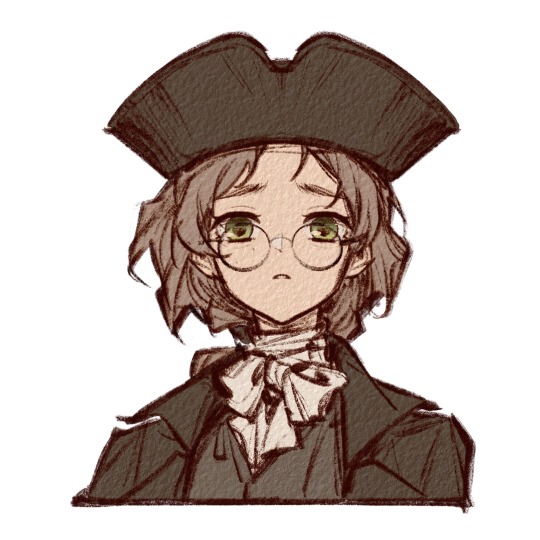
commission art w/ @naxim 😇😇🙏🏻(I'm not the author of this art! )
*petition on more young Robespierre content 🫡
老师画的幼罗特别特别萌呜呜呜呜呜
75 notes
·
View notes
Text

#france#gilet jaune#gillets jaunes#résistance#révolution french#révolution#anonynous#french#gilets jaune#resistance
0 notes
Text

May 8 is the day of celebration of the Supreme Being!! Citizens, let's celebrate these days of joy with beautiful phrases, art and dedications to the Supreme Being!!!
Illustration by Maxime
#festival of supreme being#french revolution#art#frev#robespierre#maximilien robespierre#artist#frev art#artists on tumblr#révolution française#the french revolution#fête de l'Être suprême
33 notes
·
View notes
Text

Ah ! C'est l'archange Saint-Just...🤍🥀
#art#my art#frev#study sketch#frevblr#saint just#la révolution française#french revolution#robespierre#(he's there staring at st just with starry lovestruck eyes)#frev art
36 notes
·
View notes
Photo

3 novembre 1793 : Olympe de Gouges est guillotinée sur ordre du Tribunal révolutionnaire Célèbre auteur de la "Déclaration des droits de la femme et de la citoyenne" et considérée comme une des pionnières du féminisme français, elle se signale d'abord par des écrits royalistes, avant de se faire républicaine deux ans plus tard, après l’évasion de Louis XVI arrêté à Varennes ➽ http://bit.ly/Olympe-Gouges
#CeJourLà#3Novembre#Olympe#Gouges#Politique#Déclaration#Droits#Femme#Citoyenne#République#Révolution#Féminisme#LouisXVI#Convention#Tribunal#Révolutionnaire#histoire#france#history#passé#past#français#french#news#événement#newsfromthepast
10 notes
·
View notes
Text
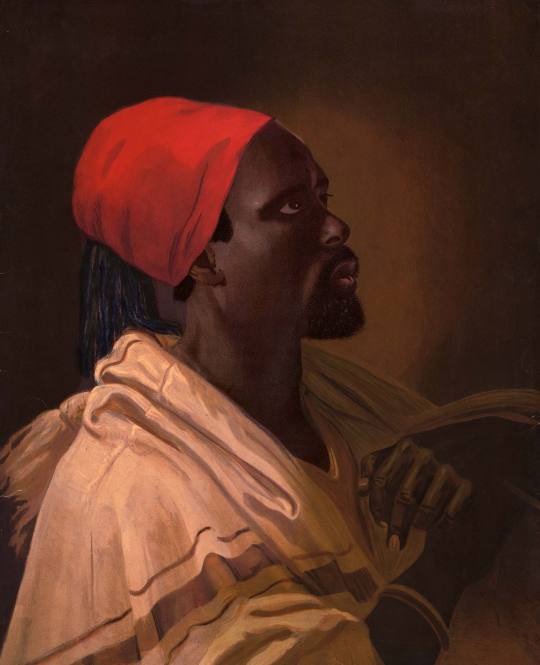
Toussaint L'Ouverture by George De Baptiste.
#George De Baptiste#haiti#République d'Haïti#Repiblik d'Ayiti#french revolution#jacobins#haitian revolution#Révolution haïtienne#Révolution française#black lives matter#Liberté ou La Mort
138 notes
·
View notes
Text
why does the boring polycule (and their kids) everyone already ships anyways gets all of the screentime. WE WANT RAREPAIRS!!!! WE WANT SIDECHARS!!! AUS ARE THE PERFECT OPPORTUNITY TO GIVE FANS ADDITIONNAL CONTENT OF CHARACTERS NOT USED MUCH IN THE CANON STORIES SO WHY DOES COMETCARE TOYHOUSES LOOK LIKE THISSSSSS (look at images numbers)


this doesnt include their in-comic appearences btw, i counted and bec has like 😭 four😭panels to her name .
im not even going to TRYto count sly's
#life is not easy being a fan of a sparklecare side character#like yeah obviously main character's gonna get more art than the rest#that's normal and to be expected#doesnt mean the rest doesnt deserve a single drawing. though#all the characters with 1 drawing to their name; it's their ref sheet. thats it. that's all they've got to their name. an outdated referenc#yayyyyyy/sarcasme#sparklecrit#sparklecriticism#sperklacera#becrit#bec is MAD okay.#four panels to my squirrel's name. im french so be careful I HAVE THE GUILLOTINE IN MY BLOOD/j#c'est l'heure de la révolution les gars dsl je n'suis plus gentil bec sors la kalash/ref#cometcrit#cometcriticism#this makes me so mad bc so many cc chars deserve to be elaborated on#Jay; hemera; till; rem & kid; ALL OF THE CHUNKLINGS???W HZRE R THEY????????#maybe im too angry bc its two am. who knows.#anyways i hope kc hears our prayers and gives us some sidechars art soon; the christmas and new year doodles made us all very happy so#please make more lblblblblblbl#i loved the finn content overload
9 notes
·
View notes